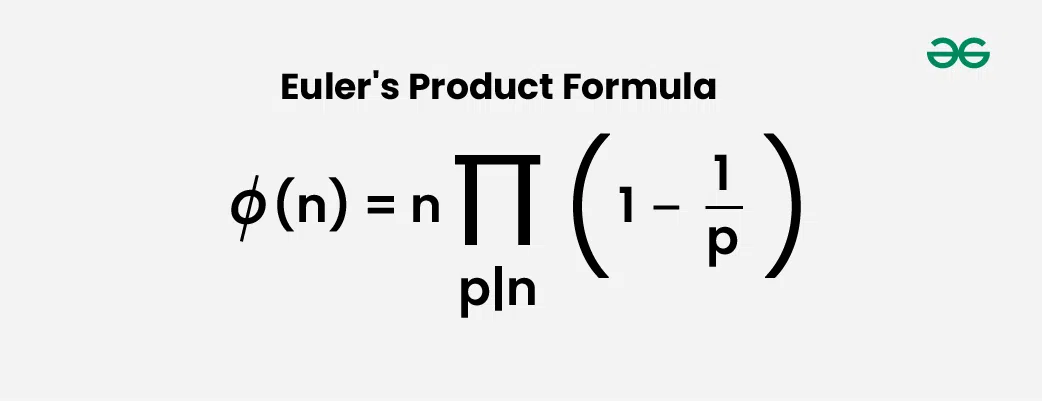Euler Totient Function in Python
Last Updated :
24 Apr, 2024
Euler’s Totient function, also known as Euler’s Phi Function Φ (n) is a mathematical function that counts the number of positive integers up to a given integer n that are relatively prime to n. i.e., the numbers whose GCD (Greatest Common Divisor) with n is 1.
Examples :
Input: Φ(1) = 1
Output: gcd(1, 1) is 1
Input: Φ(2) = 1
Output: gcd(1, 2) is 1, but gcd(2, 2) is 2.
Input: Φ(3) = 2
Output: gcd(1, 3) is 1 and gcd(2, 3) is 1
Using Iteration:
In this approach, we iterate through all numbers from 1 to n-1 and check if each number is coprime with n using the gcd function and find if the gcd of i and n is 1 thus incrementing the count of coprime numbers and finally returning the count.
Step-by-step approach:
- Define a GCD function to find the greatest common divisor.
- Define Euler’s Totient Function.
- Iterate through numbers from 1 to n-1.
- Check coprimality with n.
- Count coprime numbers.
- Return the count.
- Execute for numbers 1 to 10 and print the results.
Below is the implementation of the above approach:
Python3
# Python3 program to calculate Euler's Totient Function
# Function to return
# gcd of a and b
def gcd(a, b):
if (a == 0):
return b
return gcd(b % a, a)
def euler_totient(n):
# Initialize the count of coprime numbers to 0
count = 0
# Iterate from 1 to n-1
for i in range(1, n):
# Check if i and n are coprime using gcd
if gcd(i, n) == 1:
count += 1
return count
# Driver program
for n in range(1, 11) :
print("Euler's Totient for", n, ":" , euler_totient(n))
OutputEuler's Totient for 1 : 0
Euler's Totient for 2 : 1
Euler's Totient for 3 : 2
Euler's Totient for 4 : 2
Euler's Totient for 5 : 4
Euler's Totient for 6 : 2
Euler's Totient for 7 : 6
Euler's Totient fo...
Time complexity: O(N^2 log N)
Auxiliary Space: O(log N)
Using Euler’s Product Formula:
The approach here is to use Euler’s Product Formula which states that the value of totient functions is below the product overall prime factors p of n to calculate Euler’s Totient Function.

The formula basically says that the value of Φ(n) is equal to n multiplied by-product of (1 – 1/p) for all prime factors p of n. For example value of Φ(6) = 6 * (1-1/2) * (1 – 1/3) = 2.
Step by step approach:
- Initialize : result = n
- Run a loop from ‘p’ = 2 to sqrt(n), do following for every ‘p’.
- If p divides n, then
- Set: result = result * (1.0 – (1.0 / (float) p));
- Divide all occurrences of p in n.
- Return result
Below is the implementation of the above approach:
Python3
# Python 3 program to calculate Euler's Totient Function using Euler's product formula
def euler_totient_product(n) :
result = n # Initialize result as n
# Iterate through all prime factors of n
p = 2
while p * p<= n :
# Check if p is a prime factor.
if n % p == 0 :
# If yes, then update n and result
while n % p == 0 :
n = n // p
result = result * (1.0 - (1.0 / float(p)))
p = p + 1
# If n is prime
if n > 1 :
result -= result // n
return int(result)
# Driver program
for n in range(1, 11) :
print("Euler's Totient for", n, ":", euler_totient_product(n))
OutputEuler's Totient for 1 : 1
Euler's Totient for 2 : 1
Euler's Totient for 3 : 2
Euler's Totient for 4 : 2
Euler's Totient for 5 : 4
Euler's Totient for 6 : 2
Euler's Totient for 7 : 6
Euler's Totient fo...
Time Complexity: O(√n log n),where n is the given integer
Auxiliary Space: O(1)
Share your thoughts in the comments
Please Login to comment...